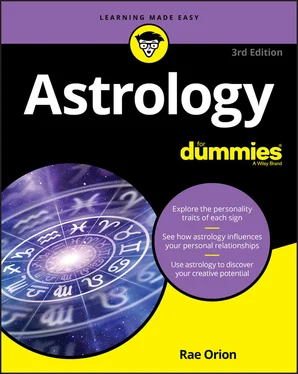When Jupiter goes out from behind the Moon, there will be hostility in the land.
When the fiery light of Venus illuminates the breast of Scorpio, then rain and floods will ravage the land.
When Mercury is visible in Kislew, there will be robbers in the land.
When Mercury approaches Spica, the crops of the land will prosper, the cattle will be numerous in the fields, the king will grow strong. Sesame and dates will prosper.
These pronouncements were messages from the gods. They were political or weather-related, focused on war and peace, floods and famine. Vague and often portentous, they were heralds of catastrophe or — less often — prosperity. But they were not personal (unless you were the king).
By the middle of the first millennium BCE, Western astronomers and astrologers — there was no difference — had settled upon the zodiac as we know it, whittling it down from 18 constellations to 12. Equally important, they had identified the ecliptic, the path followed by the Sun as it rolls across the sky, and divided it into 12 sections, each 30 degrees long. This advance allowed for the creation of the signs (as distinct from the constellations), each one equal in duration, length, and value. Thus the seeds of modern astrology were strewn in ancient Babylonia. From there, they wafted into Egypt, into Greece, and throughout Mesopotamia all the way down to Chaldea, a small area in the southeast where observers recorded eclipses and other celestial phenomena. In time, as Chaldea was absorbed into the larger, more powerful Babylonia, the word “Chaldean” gradually came to mean one thing: astrologer.
Romping through Classical Times
Political changes swept across the ancient world during the first millennium BCE. In 539 BCE, the Persians under Cyrus the Great conquered Mesopotamia and the rest of the Middle East. Two hundred years later, Alexander the Great vanquished the same area and ventured beyond it into Egypt and to the border of India.
The shattering aftermath of these invasions — the Persians from the east in 539, and the Greeks from the west in 331 — was not just military or political. It was cultural. Throughout the conquered region, Greek became the common language and cross-cultural pollination became the norm, to the benefit of astrology. Egyptian astrologers offered a solar calendar along with an emphasis on the angles of the horoscope and whatever was rising, be it star or constellation. Babylonian astrology provided the zodiac, tables of planetary movement, an endless supply of lunar and planetary lore, and the idea that the planets were gods. The Greeks, who valued astronomy and mathematics but had never done much with astrology, soaked it up. Even Plato, who had his reservations, was curious enough to study it in his old age with — yes — a Chaldean.
Why did the Greeks, who supposedly prized lucidity and reason, respond so strongly to a subject that skeptics think of as possessing neither of those qualities? Because it struck them as scientific, structured, and based on precise measurements, unlike methods of divination such as interpreting the flight of birds or trying to decipher the utterances of an oracle inhaling vapors from a cauldron, as at Delphi. Like geometry, astrology looked supremely rational, and the intellectual class accepted it. It took a while to filter down to the shipbuilders and the shepherds. But filter down it did.
To learn astrology in ancient Greece, you went to the island of Kos, birthplace of the physician Hippocrates. In 280 BCE, a Babylonian named Berossus who was an astrologer, a historian, and a priest of the goddess Bel Marduk, founded a school of astrology there and cast thousands of horoscopes, not one of which has survived. Pliny the Elder, the Roman naturalist who died in the eruption of Mount Vesuvius in 79 CE, reported that Berossus was so admired that after his death, the citizens of Athens erected a statue of him with a golden tongue.
The most important classical contribution to astrology came from an Egyptian geographer, mathematician, astronomer, and astrologer named Claudius Ptolemy who lived in Alexandria. Born around 100 CE, Ptolemy wrote two books of interest to astrologers: the Almagest , an astronomy book that includes tables and detailed mathematical instructions for determining planetary and house positions; and the Tetrabiblos , the most influential astrology book ever written (in four parts: hence the title). It explained elements, aspects, fixed stars, the astrology of nations, of birth defects, of parents, brothers and sisters, twins, disease, death, and more. As late as the seventeenth century, Ptolemy’s Tetrabiblos was being taught in universities. It has been described as the Bible of astrology.
In the Roman Empire, astrology and divination were the cat’s meow. Romans paid attention to portents, and there were portents aplenty: comets, dreams, lightning, snakes, lamps that abruptly flickered out (a good omen, or so thought Tiberius), laughing statues, decapitated statues, trees growing in unexpected directions, and birds — ravens, eagles, vultures, doves, wrens, and sacred chickens — behaving badly. Not everyone supported astrology. Cicero, for one, questioned it. But emperors consulted astrologers, and they did so on a regular basis.
In 44 BCE, Shakespeare tells us, Julius Caesar foolishly ignored a soothsayer’s advice to “Beware the Ides of March.” That seer, according to Cicero, was Vestritius Spurinna, who could read the future in the stars and in the entrails of sacrificed animals.
Caesar’s successor was his adopted son Augustus, who in his youth visited the astrologer Theogenes with his friend Agrippa. Theogenes prophesized such wondrous good fortune for Agrippa that Augustus was certain that he would suffer in comparison. But after Theogenes cast his chart, he threw himself at Augustus’s feet. Augustus was so heartened that he had his horoscope published and issued coins emblazoned with the symbol of Capricorn, thereby sending historians into a tizzy that has lasted over 2000 years. (See sidebar.)
WAS AUGUSTUS A CAPRICORN?
He was not, although he liked the symbol. The Roman historian Suetonius reports that Augustus was born before sunrise on September 23 in 63 BCE. Do the chart for that day, and you will see that Augustus was a Virgo (not a Libran) with the Moon in Capricorn. But astrology in those days did not rise and set with the Sun. Other planets were equal in importance. So his allegiance to Capricorn could allude to his Moon sign. Or it could be a nod to his conception, an event Roman astrologers deemed to have occurred 273 days prior to birth, in which case Augustus would have been conceived in late December — in Capricorn. Or maybe Augustus just wanted to capitalize on the imperial grandeur of Capricorn. Perhaps his regard for the sea-goat was a form of branding. The seventeenth-century astronomer Johannes Kepler, who was a full-fledged astrologer, investigated the matter for Emperor Rudolph II, hoping to figure out why the emperor favored the sign. He never reached a conclusion, and scholars are still mulling it over.
After Augustus came Tiberius, whom Pliny the Elder considered “the gloomiest of men.” Tiberius believed in astrology but didn’t trust astrologers, so he tested them. He and the astrologer, accompanied by a powerfully built freedman, would climb to the top of a cliff high above the sea where the astrologer would interpret his chart. If Tiberius felt deceived or dissatisfied, the freedman pitched the astrologer over the cliff.
So when the astrologer Thrasyllus was asked to give a cliff-side consultation, he predicted a glorious future for Tiberius. Then the emperor asked how he saw his own prospects. Tiberius cast a chart and, trembling, exclaimed that a perilous, possibly fatal crisis was looming over him. Tiberius, who knew this to be true because he was indeed thinking about that cliff, congratulated the astrologer on his perspicacity and embraced him as a member of his household. They became close friends but after a while, Tiberius started to lose faith. One day, as he and Thrasyllus strolled along the cliff, the astrologer spotted a distant ship and announced that it would bring good news. For once, he was right: “a lucky stroke,” says Suetonius, “which persuaded Tiberius of his trustworthiness.”
Читать дальше












